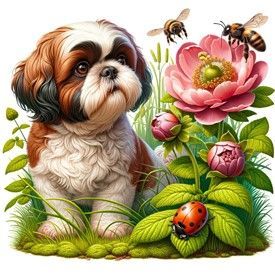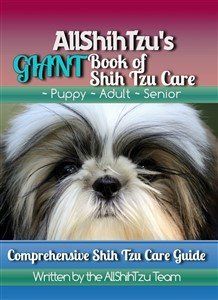Shih Tzu Stung by Bee, Wasp, Hornet, Yellow Jacket, Ants
Overview
In the spring, there is an emergence of bees, hornets, wasps, and other stinging insects, active until fall. Bees are day-active, while some types of worker hornets can be seen at night. This poses a nearly round-the-clock risk for Shih Tzu dogs when outdoors, more prone to stings than some other breeds, due to their low height and coat of hair (as opposed to thick fur). Stings can cause pain or severe allergic reactions, sometimes leading to emergencies.
What if your Shih Tzu encounters aggressive bees and what steps should you take for a sting? Let's explore the risks posed by bees, hornets, yellow jackets, wasps, and red ants, how to handle stings or swarming, preventive measures to reduce the likelihood of attacks, and treatments for stings.
Two Things to Know About Insect Stings with Dogs
What to Know About Common Stinging Insects and Dogs
Insects like bees, wasps, hornets, yellow jackets, and fire ants are common in various environments. While they play crucial roles in our ecosystem, their stings can be problematic, especially for canines. Let's take a quick look:
Bees, known for their vital role in pollination, can sting when threatened. A bee's sting can cause pain and swelling in dogs. Unlike humans, dogs might get stung in the mouth or throat if they try to catch the bee, which can be dangerous due to swelling.
Wasps, which are more aggressive than bees, can sting multiple times. Their stings can cause dogs to have localized pain and swelling. In some cases, dogs might have an allergic reaction, which requires immediate veterinary attention.
Hornets are larger and more aggressive than many other stinging insects. Their stings can be quite painful and can cause significant swelling and discomfort in dogs. Multiple stings or a single sting near the face or inside the mouth can be particularly dangerous.
Yellow jackets are aggressive and can sting repeatedly. Their stings can be very painful for dogs, leading to swelling and itching. Like wasp stings, yellow jacket stings can also cause allergic reactions in some Shih Tzu dogs.
Fire ants can inflict painful stings. These stings can cause red, swollen spots that are itchy and uncomfortable for dogs. In cases of multiple bites, dogs can experience severe pain and potentially serious allergic reactions.
Other Relevant Insects: Bald-Faced Hornets can deliver a painful sting, causing swelling and pain in dogs, similar to other hornet stings. And European Paper Wasp stings can be painful and cause similar reactions in dogs as other wasp stings.

What to Do if Your Shih Tzu is Being Attacked by Bees or Other Flying, Venomous, Stinging Insects
At-Home Treatments for Insect Bites to a Shih Tzu


Home vs Vet Care and Allergic Reactions to Stings or Bites
5 Facts to Know:
#1 Even if your Shih Tzu has previously tolerated multiple stings, a single sting can potentially cause a life-threatening reaction next time. A Shih Tzu might be fine after a bee sting but severely allergic to a wasp. Therefore, it's important to closely monitor your dog for at least an hour after any sting.
#2 If your Shih Tzu is stung more than 15 times, it's advisable to visit the vet, as the accumulation of venom can cause a toxic reaction. Common symptoms include nausea, vomiting, diarrhea, dizziness, weakness, fainting, convulsions, and fever. For humans, the threshold is 8.6 stings per 10 lbs. of body weight.
Allergic Reactions Considered to be an Emergency
- Facial Swelling
– With canines, this is most noticeable about the eyes and the lips. It may affect one or both eyes.
- Abnormal swelling of sting site
– While some minor swelling is expected when a dog gets stung, if the swelling spreads (the bite was on the foot, but now the leg is becoming swollen, etc.) this is a red flag.
- Breathing issues
– The dog may have raspy breathing
or start wheezing, though any change in breathing patterns is a huge red flag.
- Behavior changes
– This includes weakness, lethargy or confused behavior.
Emergency Treatment
Preventing Your Shih Tzu From Getting Stung

Are You an AllShihTzu Member?
You May Also Like:
Top 10 Shih Tzu Essentials Under 10 - The best care items for a Shih Tzu that are less than $10. Affordable products to help keep your little guy or gal happy and healthy without sacrificing quality.
Top 5 Floral-Themed Shih Tzu Care Items - Our pick of the top 5 most wonderful flower-based essentials. From engaging toys for independent play to immune-boosting treats packed with antioxidants, you'll love the benefits of these floral delights.
How to Fix Shih Tzu Bad Breath - If your Shih Tzu's breath is a bit or a lot stinky, this is a helpful guide. See what causes this and some great at-home treatments.
Food-Related Articles:
Shih Tzu Feeding Guidelines - Details of all food-related topics. Schedules, wet vs dry, grain vs grain-free, homemade foods, top recommendations for both puppies and adults, and more.
Dietary Supplements for Shih Tzu - The 7 most important supplements that a Shih Tzu may need. You may be very surprised at how vital #5 is yet how easy it is to offer this.
Safe and Soothing Treats for Shih Tzus with Digestive Issues - If your Shih Tzu has a tummy that’s quick to protest, finding the right treat can feel like a guessing game. Thankfully, there are gentle options that dogs find super-delicious. See our list of the best belly-friendly treats.
Grooming-Related Articles:
Tips to Keep a Shih Tzu Clean and Tidy - Shih Tzu puppies and dogs can get a bit messy and even smelly in between baths. Helpful tips for keeping your little guy or gal looking nice and tidy.
Grooming Tools for a Shih Tzu that Do the Job - It's much easier to keep a Shih Tzu looking nice and tidy when you use the right brushes and tools. See our complete list of the essential items to have on hand.



